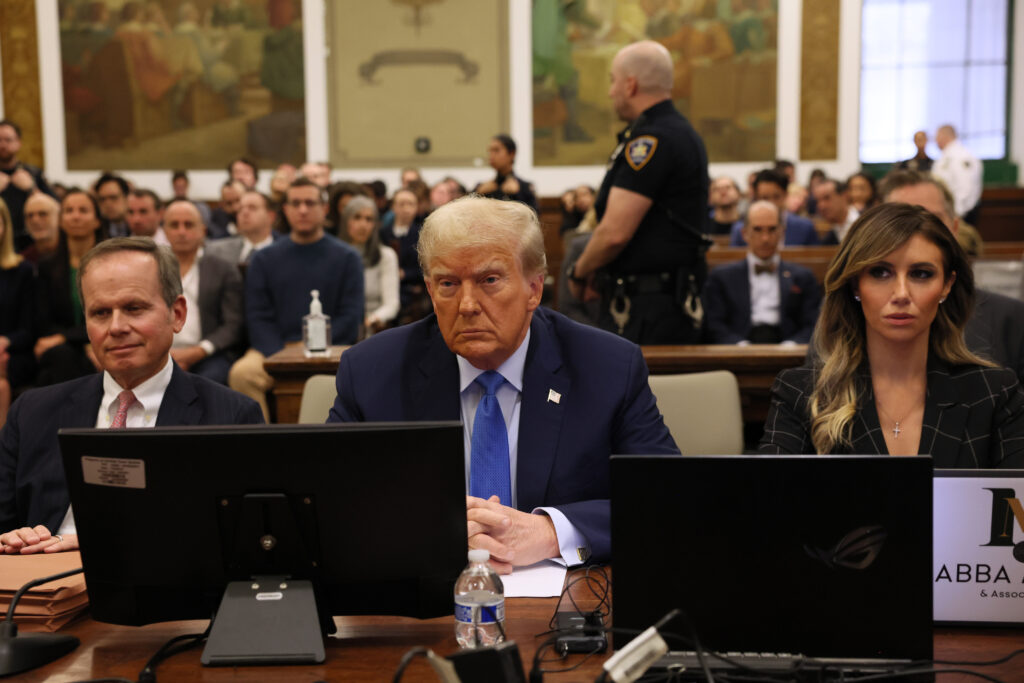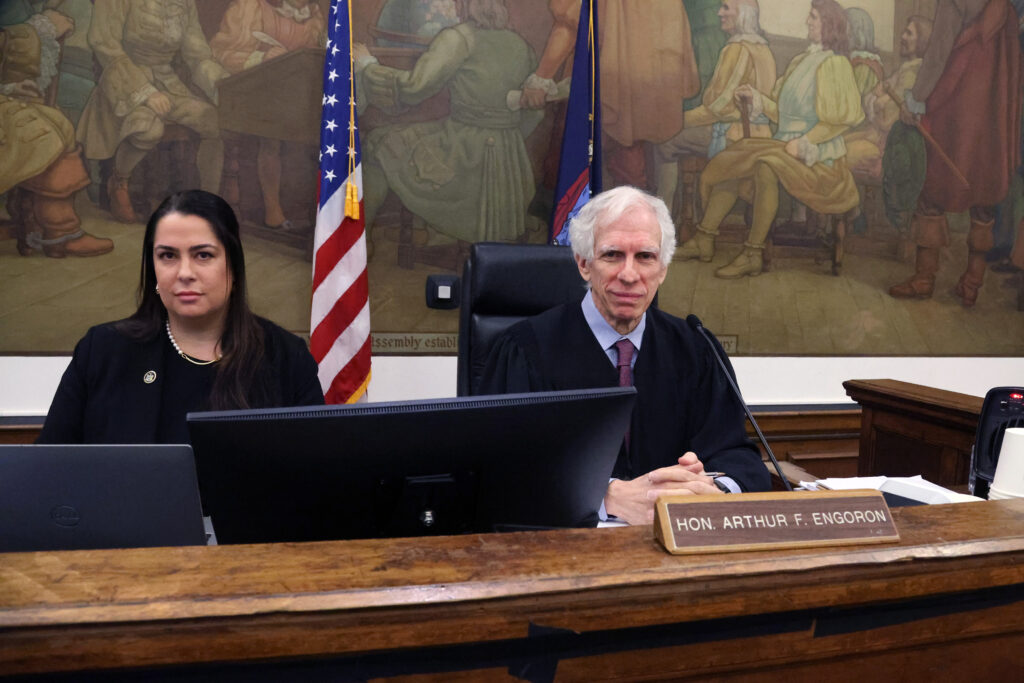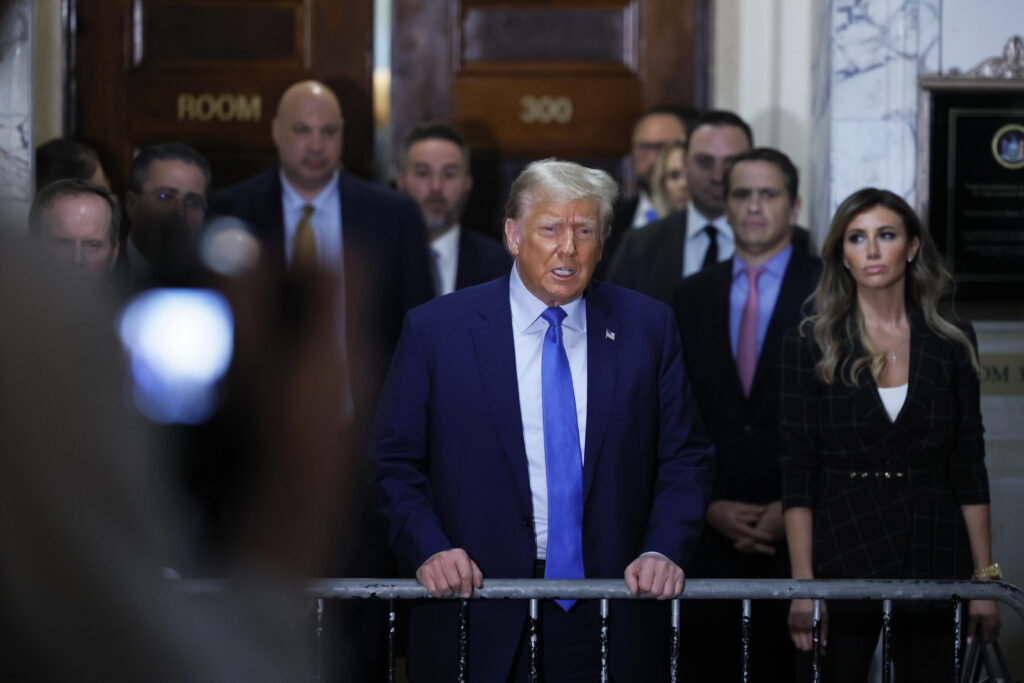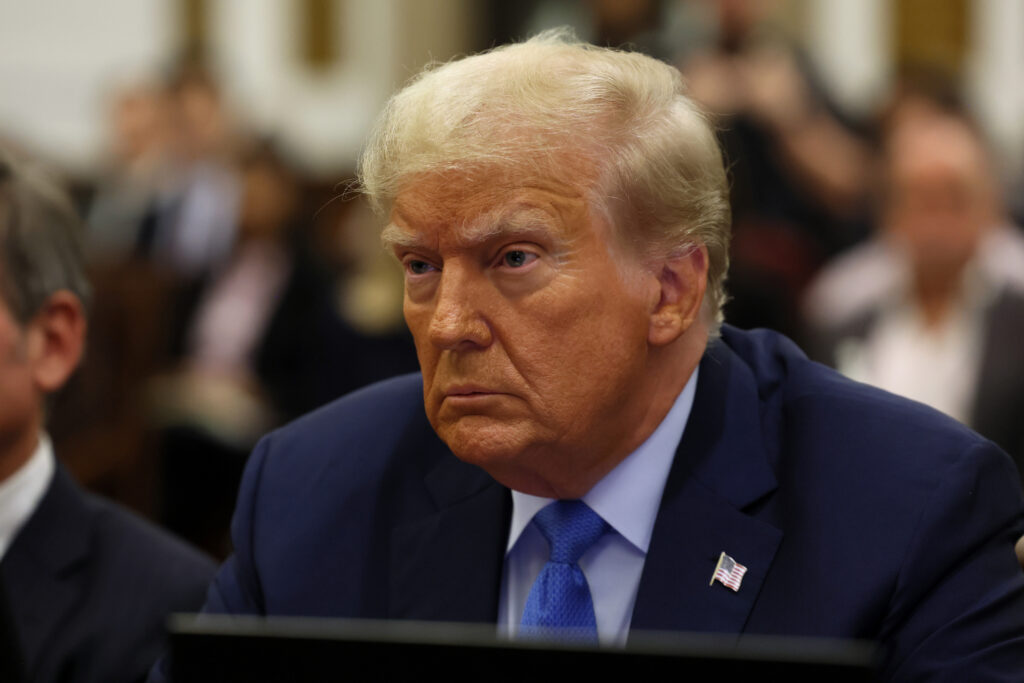‘The Fraud Is on the Court, Not on Me’: Trump Takes the Witness Stand and Wheels on the Judge and Attorney General Trying To Bring Down His Company
‘Please don’t make speeches,’ the judge asks Trump. Trump’s attorney later calls the judge ‘unhinged.’

A smoldering President Trump took the witness stand at his civil fraud trial on Monday, exchanging barbs and glares with the presiding judge and hurling invective at both the judge, Arthur Engoron, and Mr. Trump’s nemesis, the attorney general of New York, Letitia James.
“The fraud is on her,” Mr. Trump charged. He turned to the judge, “You believe this political hack-pack there? That’s unfortunate.”
The future of the Trump family’s real estate holdings in New York is at stake in the case — including signature Trump properties like Trump Tower and 40 Wall Street. By alleging fraud, Ms. James is aiming to end the Trump Organization’s long “fraudulent” reign in the high echelons of New York’s real estate business.

The civil lawsuit filed against the Trump Organization by Ms. James alleges that Mr. Trump and his sons, Donald Jr. and Eric, as well as others in the Trump Organization committed fraud by inflating the value of Trump real estate holdings by as much as $3.6 billion. The alleged scheme helped them secure loans and insurance at lower rates and premiums, saving the Trumps money but costing banks and insurance companies in lost revenue.
Judge Engoron has already found that Mr. Trump and his co-defendants did, in fact, commit fraud. He granted Ms. James’s request for partial summary judgment in her favor on the fraud claim against the Trump Organization in a decision on September 26.
From the stand, Mr. Trump on Monday accused Judge Engoron of bias. “He ruled against me without knowing anything about me. He called me a fraud and he didn’t know anything about me,” he charged.
Yet the judge turned to Mr. Trump telling him, ”If you want to know about the disclaimer clause, read my decision.” He snapped. “Read my opinion perhaps or for the first time.”

“I think it’s fraudulent, the decision,” Mr. Trump replied. “The fraud is on the court, not on me.”
During Mr. Trump’s testimony, the judge repeatedly expressed his exasperation at the former president’s filibustering. “Some of your answers have not been responsive to the questions,” he scolded. “Please don’t make speeches.”
Based on his September 26 decision, Judge Engoron has already revoked Mr. Trump’s licenses to do business in New York — tantamount to an order ending the Trump real estate empire in the Empire State. Yet that order was stayed by an appellate court until it can hear an appeal.
Besides fraud, Ms. James alleged six other claims, such as submitting false financial records, insurance fraud, and conspiracy. The current trial will decide who, if anyone, is liable for these claims as well — and how high the fine will be. Ms. James is asking for $250 million.
At first on Monday, the courtroom scene was calm, and Mr. Trump was so composed that Judge Engoron even asked him to speak more loudly and into the microphone. Mr. Trump began giving answers that were far longer than the questions he was being asked by a lawyer for the attorney general, Kevin Wallace, and the judge began to grow impatient.
The judge told Mr. Trump’s defense lawyer, Chris Kise, to “control his witness,” and he told Mr. Trump to answer the yes-or-no questions with “yes” or “no.” “We are not here to hear what he has to say. It’s a simple yes or no question,” the judge said.
Another defense lawyer, Alina Habba, interrupted, and told the judge that some answers were not that simple and deserved an explanation. At which point, the judge grew so impatient that he screamed at Ms. Habba, “Sit down, lady.”
He went on to admonish the famously voluble 45th president of the United States to keep his answers short. Otherwise, he warned, he would remove them from the official record and draw a “negative inference” against Mr. Trump for failing to testify.
During the lunch break, Ms. Habba fired back at the judge, telling reporters outside the courthouse that he was “unhinged.”
Ms. James’s case against Mr. Trump centers on financial documents called Statements of Financial Condition. Ms. James alleges that Mr. Trump and his sons inflated their company’s net worth and the assets values on the SFCs they filed.

Both of Mr. Trump’s sons testified that they relied on professional accountants and lawyers to prepare the SFCs. “I leave it to my accountants,” Donald Trump Jr. testified. “I rely on their opinions and their assessments to make those decisions.”
His father admitted on Monday he was personally involved in preparing the statements. “I would look at them, I would see them, and I would maybe on occasion have some suggestions,” he testified.
For one, he said, he thought his Mar-a-Lago estate at Palm Beach, Florida, was undervalued in one of the statements. “I thought that Mar-a-Lago was very underestimated, but I didn’t do anything about it,” Mr. Trump said. “I just left it be.”
On the other hand, he said he thought another property, Seven Springs Estate at Westchester, New York, was overvalued.
“I thought it was high,” he said.
The admissions that he was personally involved in preparing the statements did not appear to bother Mr. Trump, who said that the SFCs don’t actually hold much importance. More important than the statements was “the cash” Mr. Trump could provide to the banks.
It was all “based on my cash,” he explained to the court. The banks “wanted cash. And I had a lot of cash.” He added that “they paid little attention to documents. Unless they were certified documents. They were more interested in the deal than in the documents.”
Mr. Trump also invoked what he suggested was a loophole that he implied warned financial institutions the statements may contain falsehoods. “We have a very important clause. It’s a disclaimer. Some people call it a ‘worthless clause,'” Mr. Trump said. “It states very clearly, do your own work. Check by yourself.”
In their prior arguments to the court, Mr. Trump’s attorneys have pointed out that the banks and insurance companies they did business with had done their own appraisals of his properties and didn’t need to rely on what they were told by the Trump Organization.
Mr. Trump had brought a SFC to court with him, took it out of his pocket, and wanted to read the disclaimer out loud in the courtroom. Yet the judge would not permit it. Instead, he instructed Mr. Trump to read his comments regarding the disclaimer in his September 26 ruling.
Finally, a lawyer for the attorney general, Mr. Wallace, asked Mr. Trump point-blank if the SFCs he filed were “wrong.” That’s when Mr. Trump went on the attack and accused Ms. James, Mr. Wallace’s boss, of being a hack persecuting a witch hunt.
In any event, Mr. Trump said, no one was really hurt: “No bank lost money. Not one insurance company lost money.”
After Mr. Wallace had ended his examination, Mr. Trump stood up, buttoned his jacket, and took a seat at the defense table. From there, his lawyers again raised the issue that had loomed over Thursday’s and Friday’s hearings: their objections to the conduct of Judge Engoron’s principal law clerk, Allison Greenfield, whom they accuse of bias, “co-judging,” and passing notes. On Friday afternoon, the judge had imposed a gag order on the defense attorneys, prohibiting them from commenting on Ms. Greenfield.

At the end of the court session on Monday, the defense lawyers asked the judge if they could file a motion for mistrial regarding the issue. The judge granted the permission and assured them that they would not be sanctioned.
Mr. Wallace also announced that the former president’s daughter, Ivanka Trump, will appear, as scheduled, on Wednesday to testify.
After the hearing both the defense attorneys and the prosecution spoke to reporters.
Ms. James said that Mr. Trump had “rambled,” “hurled insults,” and had “continued to persistently engage in fraud.” She concluded that “the numbers don’t lie,” adding that “Mr. Trump obviously can engage in all of these distractions, and that is exactly what he did.”
Mr. Kise, on the other hand, seemed very pleased with his client’s testimony. “In my 33 years, I have not had a witness testify better,” he said. “He’s not backing down. He’s told everyone the facts. Now that the American people know what’s going on, maybe something will change.”
The decision the judge will make will influence the appeals court’s ultimate decision on whether to permanently revoke Mr. Trump’s business licenses or reinstate them.

